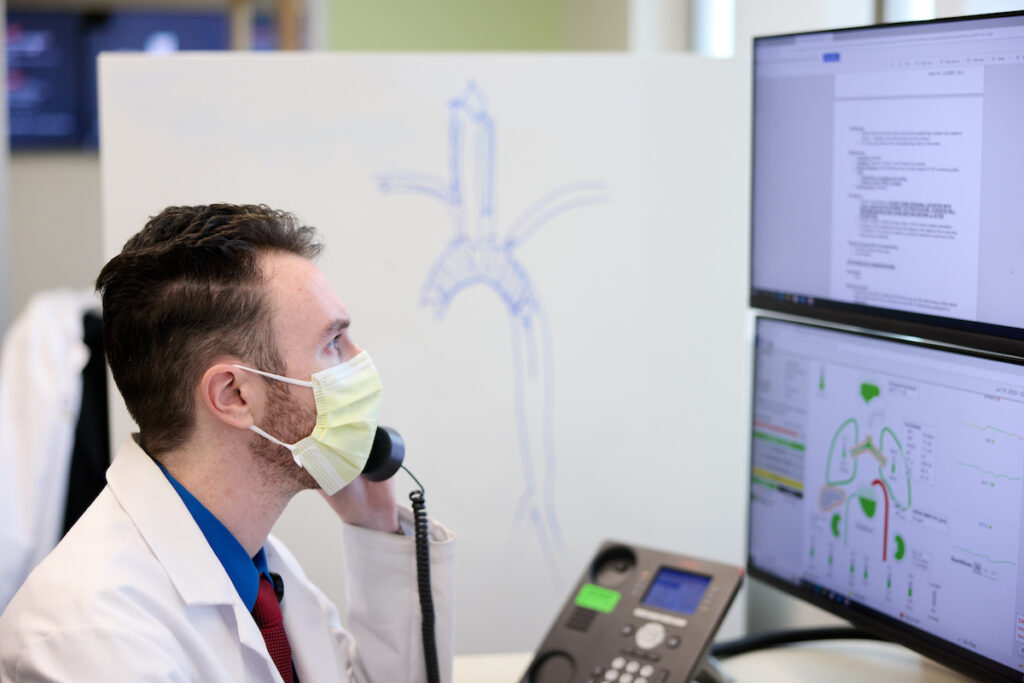“When I was looking for residency programs, I was interested in going somewhere that would develop my skills as a physician-scientist,” said Jeremy Thompson, MD, PhD, a PGY-5 resident and participant in the department’s Academic Scholars Advancement Program (ASAP). “ASAP provides robust clinical training, and the department’s research output is unmatched. This is what makes ASAP such an appealing pathway for trainees who are interested in both clinical and research training.”
The Department of Anesthesiology’s ASAP training program combines residency, fellowship, and integrated research time, providing accelerated career development for physician-scientists specializing in anesthesiology. The program is designed to reduce barriers to becoming a physician-scientist while simultaneously nurturing skilled and confident clinicians.
The ASAP pathway maximizes training efficiency to accelerate total training, including residency, fellowship, and research, by two years off the traditional training period while also providing comprehensive mentorship and support for trainees to establish research programs, write grants, and ultimately transition to independent investigators.
In the first three years, ASAP trainees are integrated into the categorical residency program. They gain exposure to the full range of clinical environments and subspecialty training opportunities. All residents participate in a balanced mix of rotations. These rotations include intern-level experiences in medicine, surgery, intensive care unit, and emergency medicine. Trainees also engage in clinical anesthesiology rotations covering general anesthesia, cardiothoracic anesthesia, pediatric anesthesia, solid organ transplant, critical care, chronic pain, and other subspecialties. At the end of their PGY-2 year, ASAP trainees select one of the department’s 11 fellowship programs. Midway through their PGY-3 year, trainees enter the clinical fellowship phase, where they spend 100 percent of their time focused on clinical training in their selected subspecialty for approximately nine months.
The capstone of the ASAP program lies in PGY-4 and PGY-5, where residents spend 80 percent of their time conducting research under the guidance of their faculty mentors and 20 percent maintaining clinical subspecialty expertise in their chosen field. This phase extends throughout the remainder of their training.
Dr. Thompson, for example, identified a research mentor and began planning a project before starting his fellowship. Midway through his PGY-3 year, he began his clinical fellowship in Pain Management. As a PGY-4 and now PGY-5, he spends 80 percent of his time focused on research and 20 percent of his time focused on clinical duties.
Upon completing their PGY-5 year, many ASAP graduates opt to remain at the School of Medicine as full-time faculty, like ASAP alumnus, Bradley Fritz, MD, MSCI, who is currently the associate ICU director of the surgical ICU.
I chose to stay at WashU because the anesthesiology department and the institution as a whole are so supportive of junior faculty who are pursuing research careers
Bradley Fritz, MD
“I chose to stay at WashU because the anesthesiology department and the institution as a whole are so supportive of junior faculty who are pursuing research careers,” said Dr. Fritz.
“The easy availability of resources, mentors, and collaborators is remarkable, and I love my clinical colleagues as well. Now, as faculty, I currently split my time with a 75 percent focus on clinical research and 25 percent on patient care in the SICU and in the tele-critical care center,” Fritz continued.
Another ASAP graduate, Sunny Lou, MD, PhD, accepted a position in the Division of Cardiothoracic Anesthesiology after completing the program in 2022. She carries out her clinical duties in the cardiothoracic division while holding a research appointment in the Division of Clinical and Translational Research (DoCTR) with a joint appointment at WashU’s Institute for Informatics.
“I think one of the standout features of the ASAP program is its provision of protected research time during residency and fellowship, allowing trainees to gather preliminary data,” said Lou. “This is crucial for developing grant applications. Most of our ASAP graduates have been able to obtain a career development award or other funding within a year of graduation.”
Within the last few years, Lou was awarded an American Medical Association grant to improve clinician efficiency and patient outcomes; received the 2022 IARS Mentored Research Award for her project “Intelligent Clinical Decision Support for Perioperative Blood Management;” and contributed to the Perioperative Blood Management Committee’s quality improvement project to reduce red cell waste, which earned the 2021 Team Award for Quality Improvement from BJC HealthCare—all while maintaining her clinical duties.
Mark Arcario, MD, PhD, another 2022 ASAP graduate who joined the cardiothoracic division recently received a Mentored Clinical Scientist Development Award (K08) from the National Institute of Health and was also awarded a $250,000 Mentored Research Training Grant (MRTG) from the Foundation for Anesthesia Education and Research (FAER) within a month of graduating. His project titled, “Understanding Allosteric Modulation of Pentameric Ligand-Gated Ion Channels by Fatty Acids,” exemplifies the potential for rapid research success provided by the ASAP pathway.
“The ASAP pathway sets trainees up for success because at the time they finish training, they have already had significant protected research time to develop the preliminary data needed to generate a competitive grant application,” said Fritz. “In more traditional programs, trainees usually won’t be able to accumulate that preliminary data until they have finished their clinical training. That means ASAP graduates have the opportunity to obtain extramural funding sooner. Like Dr. Arcario, I was also awarded a Mentored Research Training Grant from FAER within a few months after graduating.”
In 2023, Dr. Thompson was awarded a $250,000 MRTG from FAER as a PGY-5 for his project titled, “Molecular Adaptations in Mesolimbic Dopamine Neurons Underlying the Transition from Acute to Chronic Pain.” The aim of Dr. Thompson’s research is to identify how brain regions that are implicated in depression are affected by chronic pain.
Drs. Arcario, Fritz, Lou, and Thompson stand as examples of the early-career success made possible by the ASAP track. This challenging and integrated training pathway was carefully established to accelerate trainees’ progress toward their career goals, offering unwavering support along the way.
For more information about the ASAP pathway or how to apply, please visit our website.
